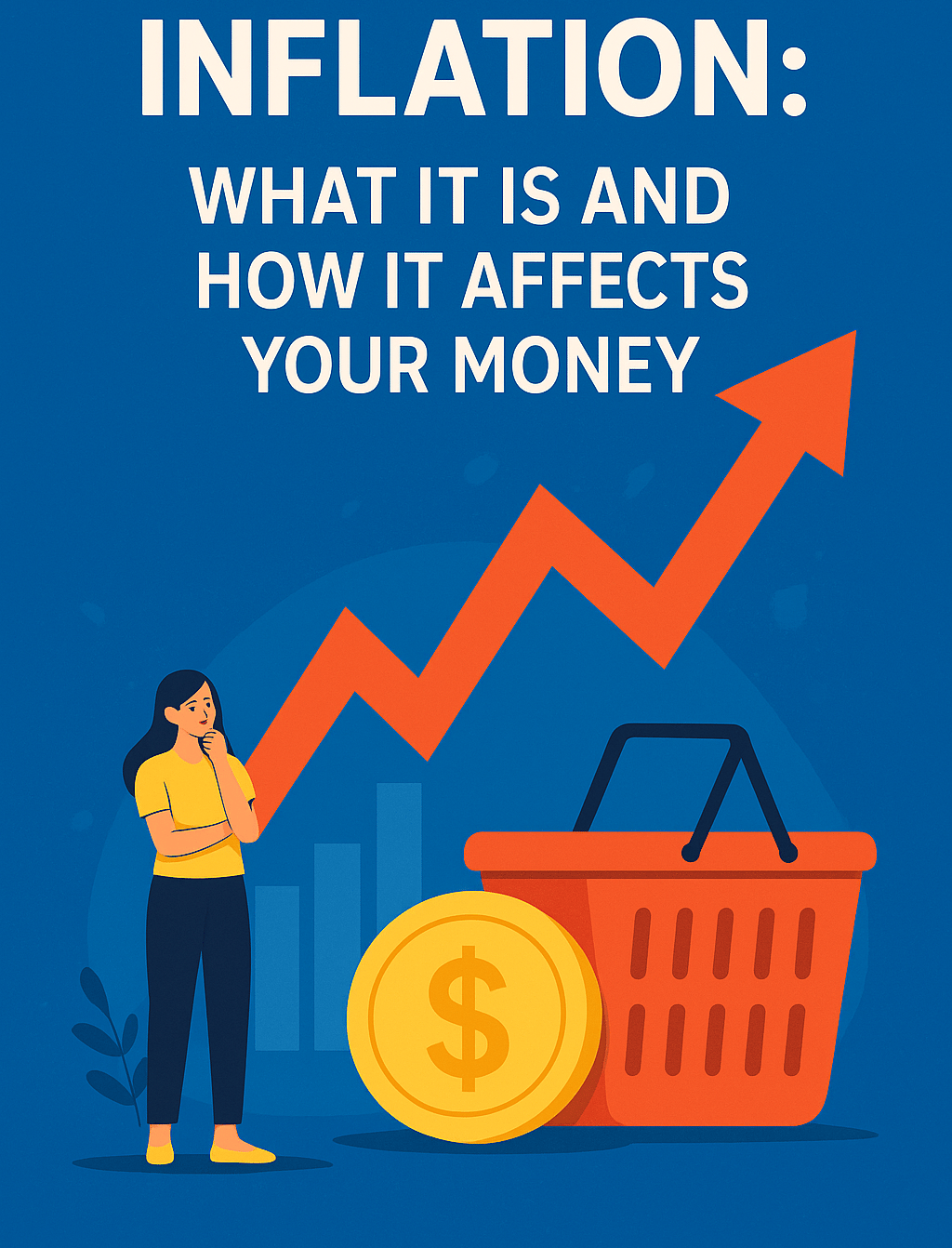📉 Inflation: What It Is and How It Affects Your Money
Understand what inflation is, how it impacts your daily life, and how to protect your finances. In this post, we explain the causes of inflation and offer practical strategies to keep your money safe and your purchasing power intact.
8/2/20253 min read


Inflation is part of our daily lives, even when we don’t realize it. If you go to the grocery store and notice that a bag of rice costs more than it did last month, you're experiencing inflation. It's an economic phenomenon that reduces the purchasing power of your money and directly impacts your lifestyle — especially for people with fixed income or who struggle to save.
In this post, we’ll explain what inflation is, why it happens, how it affects your finances, and the best strategies to avoid losing money because of it.
🔍 What is inflation?
Inflation is the general and continuous increase in the prices of goods and services over a period of time. In simpler terms, it means that prices go up, and the value of your money goes down. You’ll need more money to buy the same things you used to buy for less.
This price increase can be temporary (due to a drought increasing electricity prices, for example) or more widespread and prolonged, which is more concerning. Inflation is tracked using indicators such as the IPCA (Broad National Consumer Price Index) in Brazil, which monitors price changes in food, transport, housing, healthcare, education, and more.
🛒 How does inflation affect your daily life?
Inflation impacts every part of the economy — and that means it affects you. Here are some common ways it shows up in your routine:
1. Reduced purchasing power
If your salary doesn’t increase along with inflation, your money is worth less. A 10% rise in the cost of living with no salary adjustment means you're poorer in real terms.
2. Higher cost of living
Basic products like food, gas, electricity, and transportation become more expensive. This hits low-income families hardest, as they spend a larger portion of their income on essential items.
3. Savings lose value
If your savings or investment returns don’t outpace inflation, you're actually losing money — even if your balance appears to grow.
4. Loans and debt become more expensive
When inflation is high, central banks often raise interest rates (like Brazil’s Selic rate), which increases the cost of loans, financing, and credit cards.
📊 What causes inflation?
There are several causes of inflation, often acting together. The main ones include:
Demand-pull inflation: Happens when consumption rises faster than supply, causing shortages and price increases.
Cost-push inflation: Arises when production costs (like wages, energy, and raw materials) go up, and companies pass those costs on to consumers.
Built-in inflation: When businesses and workers adjust prices and wages based on past inflation, creating a cycle.
External shocks: Global events like wars, pandemics, or energy crises can disrupt supply chains and push prices up worldwide.
💡 How to protect yourself from inflation?
While you can’t stop inflation, you can take steps to limit its effects:
✅ 1. Invest for real returns
Avoid keeping all your money in savings accounts. Choose investments that beat inflation, such as Treasury Inflation-Protected Securities (like Tesouro IPCA+), inflation-indexed funds, stocks of strong companies, or real estate funds.
✅ 2. Budget and track expenses
Reevaluate your spending regularly, cut unnecessary costs, and build an emergency fund. Knowing exactly where your money goes gives you more control in uncertain times.
✅ 3. Find extra sources of income
Earning more can help offset rising living costs. Offer services, sell products online, monetize a skill, or invest in education to improve your job opportunities.
✅ 4. Shop smart
Take advantage of sales, buy in bulk when possible, and avoid impulse buying. Use price comparison and cashback apps to save money.
📈 How does the government fight inflation?
The government’s main tool to control inflation is adjusting the interest rate (Selic in Brazil) through the Central Bank. When inflation rises, the interest rate usually goes up to reduce consumption and investment, slowing down price growth.
However, this strategy can slow the economy and increase unemployment. That’s why it’s crucial for the government to maintain balanced public finances and adopt responsible fiscal policies.
🧠 Conclusion
Inflation affects all of us, but understanding how it works is the first step toward protecting your money. With knowledge, planning, and financial discipline, it’s possible to maintain your purchasing power and keep progressing toward your financial goals — even during tough economic times.